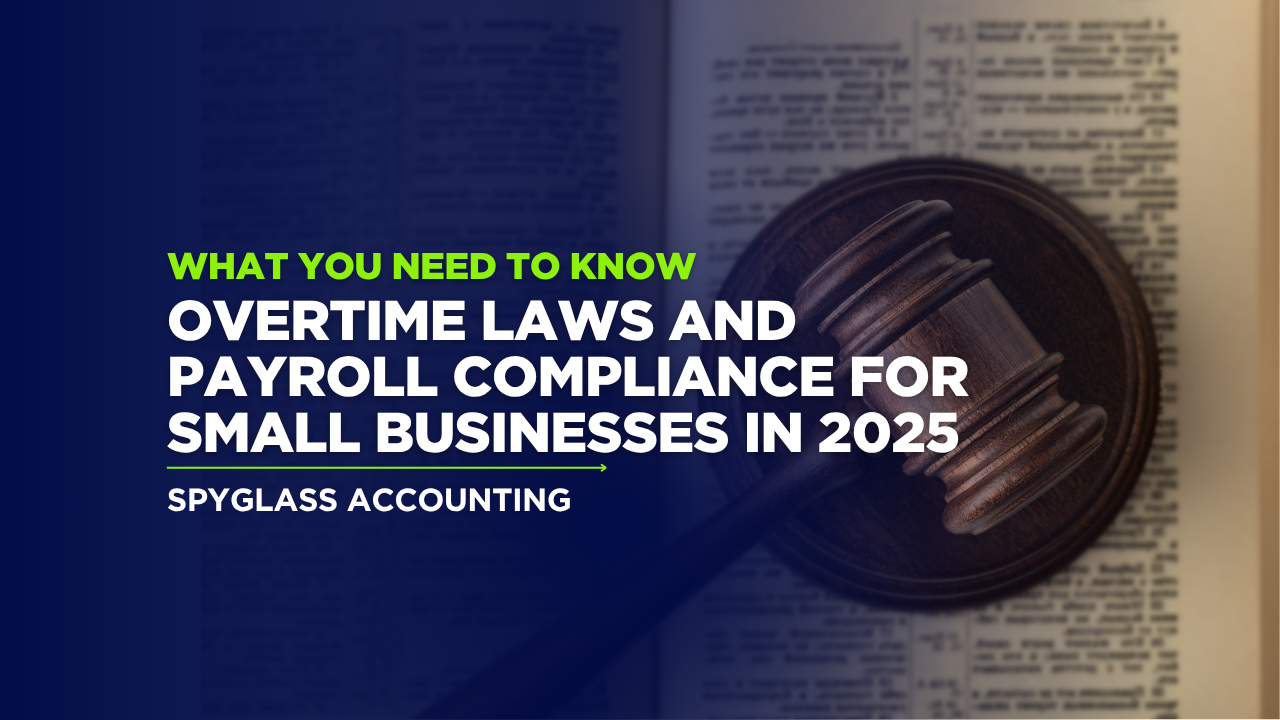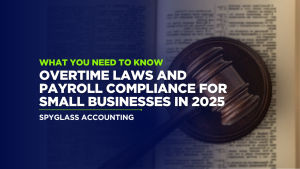
Overtime Laws and Payroll Compliance for Small Businesses in 2025: What You Need to Know
Introduction
As a small business owner, staying compliant with overtime laws and payroll regulations is crucial—but it’s not always easy. With the Department of Labor (DOL) updating overtime thresholds annually, keeping up can feel overwhelming.
In July 2024, the DOL increased the salary threshold for exempt employees to $43,888 per year, and another update is expected in July 2025. If you haven’t reviewed your payroll policies yet, now is the time.

This guide will break down:
✔ Latest overtime laws for 2025
✔ How to classify employees correctly
✔ Common payroll mistakes to avoid
✔ Steps to ensure compliance
✔ How payroll automation can help
By the end, you’ll have a clear roadmap to avoid fines, lawsuits, and payroll errors while keeping your employees happy.
- What Changed in 2024 & What to Expect in 2025
Key Updates to Overtime laws
The Fair Labor Standards Act (FLSA) requires employers to pay non-exempt employees 1.5x their regular rate for hours worked beyond 40 per week.
In July 2024, the DOL raised the salary threshold for exempt employees to:
- $43,888 per year ($844 per week)
This means:
- If an employee earns less than $43,888/year, they must be paid overtime as per overtime laws—even if they’re salaried.
- If they earn more, they may still qualify for exemption if their job duties meet FLSA criteria.
What’s Coming in 2025?
The DOL updates this threshold every July, so expect another increase in 2025. While the exact number isn’t confirmed yet, businesses should:
✔ Audit employee salaries now
✔ Adjust payroll budgets
✔ Consider reclassifying employees if needed
Example:
If an employee makes $40,000/year and works 45 hours in a week, they must be paid overtime for the extra 5 hours.
- Regular hourly rate: $20/hour
- Overtime rate: $30/hour
- Total overtime pay: $150 extra per week
For businesses with multiple salaried employees working overtime, this can significantly impact labor costs.
- Employee Classification: Exempt vs. Non-Exempt
One of the biggest payroll mistakes small businesses make is misclassifying employees. Just because someone is salaried doesn’t mean they’re exempt from overtime laws.

Who Qualifies as Exempt as per Overtime laws?
To be exempt, employees must:
- Be paid on a salary basis (fixed minimum amount per week)
- Meet the salary threshold ($43,888+ in 2024, likely higher in 2025)
- Pass the duties test (executive, administrative, professional, outside sales, or computer-related roles)
Common Exempt Roles:
✅ Executives (managers, supervisors)
✅ Administrative employees (HR, accounting)
✅ Professionals (doctors, lawyers, engineers)
✅ Outside sales reps
✅ Computer employees (software developers, systems analysts)
Who is Non-Exempt?
If an employee doesn’t meet all three criteria, they are non-exempt and must be paid overtime as per overtime rules.
Example of Misclassification:
A salaried assistant manager making $40,000/year who mostly does non-managerial tasks (like stocking shelves or serving customers) may not qualify as exempt. If they work 50 hours/week, they’re owed overtime.
Consequences of Misclassification:
⚠ Back pay claims (up to 2 years of owed overtime)
⚠ DOL fines (up to $10,000 per violation)
⚠ Employee lawsuits (damaging to reputation and finances)
- Common Payroll Mistakes to Avoid
Even well-intentioned businesses can accidentally violate overtime laws. Here are the top mistakes to watch for:
- Assuming “Salaried = Exempt”
Salary alone doesn’t determine exemption—job duties and pay thresholds matter.
- Not Tracking Hours for Salaried Non-Exempt Employees
If an employee is salaried but under the threshold, you must track their hours and pay overtime.
- Excluding Bonuses & Commissions from Overtime Calculations
Some bonuses must be included in the overtime rate calculation.

- Ignoring State Overtime Laws
Some states (like California, New York, and Colorado) have stricter overtime rules than federal law.
Example:
- Federal law: Overtime after 40 hours/week
- California law: Overtime after 8 hours/day or 40 hours/week
- Conduct a Mid-Year Payroll Audit
Since the DOL updates thresholds every July, review:
✔ Salaries of exempt employees (are they above the threshold?)
✔ Job duties (do they still qualify as exempt?)
Action Steps to comply with Overtime Laws:
- Raise salaries to keep employees exempt (if financially feasible).
- Switch to hourly for employees close to the threshold.
- Use Automated Time Tracking
Manual timesheets lead to errors and compliance risks. Instead, use digital time-tracking tools that:
✔ Record hours accurately
✔ Flag overtime automatically
✔ Integrate with payroll software
- Train Managers on Overtime Policies
Unauthorized overtime can sneak up on businesses. Train managers to:
✔ Monitor employee hours
✔ Approval overtime in advance
✔ Avoid “off-the-clock” work (e.g., answering emails after hours)
- Stay Updated on 2025 Changes
The DOL will announce the new threshold in mid-2025. Subscribe to DOL updates or work with a payroll provider (like Spyglass Accounting) to stay ahead.
Managing overtime compliance doesn’t have to be stressful. At Spyglass Accounting & Financial Services, we help small businesses:
✅ Automate payroll & overtime calculations
✅ Conduct compliance audits
✅ Handle state & federal payroll laws
✅ Avoid costly fines and lawsuits
Want to ensure your payroll is compliant? Contact us today for a free payroll review.

Final Thoughts
Overtime laws are constantly evolving, and 2025 will bring new changes. By auditing your payroll now, tracking hours accurately, and using the right tools, you can avoid penalties and keep your business running smoothly.
Need help staying compliant? Spyglass Accounting specializes in small business payroll solutions. Get in touch to learn more!